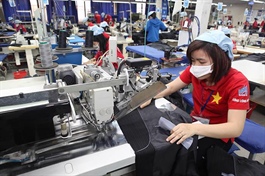Dual opportunity for Viet Nam in offshore wind industry development
Dual opportunity for Viet Nam in offshore wind industry development
Offshore wind is a great dual opportunity for Viet Nam, helping deliver green and cost-efficient energy for the continued economic development of the country and at the same time support Viet Nam in achieving its net-zero by 2050 commitment made in COP 26.

Nicolai Prytz, Denmark ambassador to Viet Nam, made the statement at the workshop “Promoting Viet Nam’s Offshore Wind Power Development: International Best Practices and Policy Recommendations” held in Ha Noi on Thursday.
Viet Nam has many favourable conditions to create a thriving offshore wind industry: a long coastline, ample wind resources, relatively shallow seabed areas suitable for fixed foundations, and a well-established supply chain that can be used almost immediately or transition relatively quickly to support many parts of the construction process and associated infrastructure needed to develop and construct an offshore wind farm.
Offshore wind, which can supply huge amounts of green electricity at attractive prices while creating new jobs and attracting investments, will play a key role in the future energy mix in Viet Nam.
Reports from the event showed that in recent decades, Viet Nam has experienced average annual growth rate of around 7 per cent in GDP, which has led to a significant increase in energy consumption as well as in associated CO2-emissions. It is key for Viet Nam that the country is able to decouple economic and energy consumption and turn its energy composition into a more sustainable energy system by investing in renewable energy.
Nguyen Duc Hien, deputy head of the Viet Nam Central Economic Commission, said Viet Nam has many potentials and opportunities to develop wind energy. Thanks to the capacity and experience of building offshore and marine works as well as supporting logistics systems of the oil and gas industry, Viet Nam could make good use of its internal resources to develop the offshore wind power industry associated with the value chain of support industries and logistics services in the coming years.
By the end of 2021, the total registered capacity of offshore wind power investment in Viet Nam was about 154GW. The draft National Power Development Plan VIII (PDP 8) sets a target to develop about 16,121MW of onshore and nearshore wind power and about 7,000MW of offshore wind power by 2030. By 2045, the offshore wind capacity is expected to reach approximately 64,500MW.
Viet Nam identified the development of offshore wind power as a breakthrough solution in energy transition, ensuring national energy security. However, because offshore wind power development is a new field, there are still many issues related to legislation, planning, investment mechanism, standards and regulations.
Hien also pointed out the big problems that face the offshore wind power industry in Viet Nam including technical and technological complexity; large and long-term capital. At the same time, many issues need to be clarified such as planning, mechanism, construction investment policy, leasing regulations, licensing, standards, operating regulations, electricity price mechanism and electricity purchase contracts and regulations on operation of power system, seaport system, and development of supply chains.
Ambassador of Denmark Nicolai Prytz said: “Being one of the strong and long supporters of Viet Nam’s transformation to a green and sustainable energy sector, Denmark is looking forward to a clear and consistent regulatory framework, which is essential for the development of the offshore wind industry, starting with the approval of the PDP 8 and exclusive offshore survey rights.”
Denmark has been a pioneer and a world leader in offshore wind energy since 1991 when Denmark commissioned the world’s first offshore wind energy farm. Today, Denmark also takes lead in reducing the cost of offshore wind power to make it one of the most competitive forms of renewable energy. This is vital and a great incentive for the rapid and widespread growth of the industry in Viet Nam.
One of the key recommendations of the report “Input to Roadmap for Offshore Wind Power Development in Viet Nam” jointly prepared by the Danish Energy Agency and World Bank is that the Government of Viet Nam should award large-scale demonstration projects to be commissioned in phases in order to kick-start the sector. It is now the time for the Government to take action if the target of having 7GW offshore wind capacity installed by 2030 as set out in the draft PDP8 is to be met.
Henrik Scheinemann, Co-CEO of Copenhagen Offshore Partners, said: "It is critical that Viet Nam should focus on instigating this proven and highly effective renewable energy industry and learn from other markets that have progressed well during their journey in order to deliver an offshore wind industry that is well-suited to the country’s needs and skills."
"It is clear that Viet Nam can and will get this industry established. Now is the time to press forward and allow pilot projects to be instigated, a clear regulatory framework to be delivered, and for developers to share learnings to build up the local supply chain and address Viet Nam’s growing thirst for green energy," said the CEO.
The workshop, co-organised by the Viet Nam Central Economic Commission and the Embassy of Denmark in Ha Noi, aimed at creating a forum for open dialogue and discussion among Vietnamese ministries and agencies with local and international organisations, experts, and businesses to share international experience and propose relevant policies for Viet Nam to develop its offshore wind power industry.




















